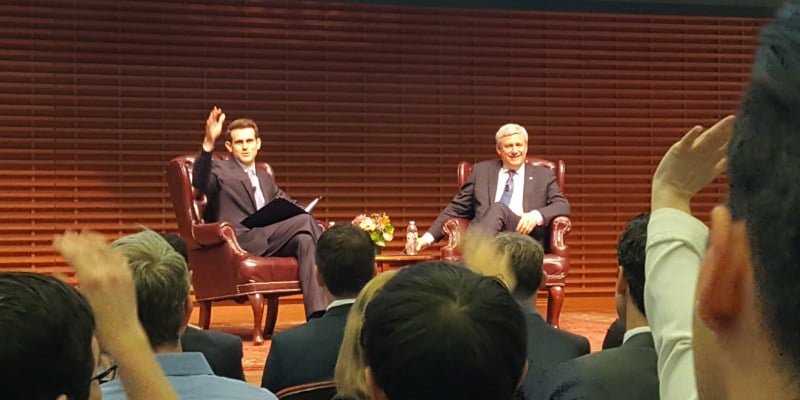On Tuesday afternoon in Cemex Auditorium, former Canadian Prime Minister Stephen Harper addressed immigration, nationalism and his own political rise.
Harper — also an economist and entrepreneur — spoke as part of the View From The Top speaker series, an initiative sponsored by the Graduate School of Business that brings global leaders to campus to share their perspectives on management and leadership. George Malkin M.B.A. ’18 moderated the talk.
Political origins
“By the time I was about nine years old,” Harper said, “my parents expected me to read the front page of the newspaper and converse in public issues at the dinner table.”
Despite his early interest in politics, Harper explained that as an undergraduate — he graduated from the University of Calgary with an economics degree in 1985 — he originally intended to remain in academia and never planned to pursue a career in politics.
As a young professional, Harper worked for one year in Ottawa as chief aide to Jim Hawkes, a Member of Parliament (MP) and Progressive Conservative party member. As Hawkes’ chief aide, Harper said, he conducted research on deficit reduction and market reform.
However, Harper said he left the position after only a brief stint because he felt “thoroughly disillusioned with what the government was not doing.”
After returning to the University of Calgary for a master’s in economics, which he completed in 1991, Harper met professors who were interested in his experiences and later connected him with someone forming what would become Canada’s right-wing, populist Reform Party. Even then, Harper said he had no intentions for his political career to become a huge commitment.
“I remember saying, ‘Well, I sort of like what they’re doing here and this is a fun hobby and it’s not going to take much of my time,’” he said.
Harper then described how he came to be a candidate for the Reform Party, saying that he took up the position simply because they had no candidates at the time. Eventually he was elected into office as a MP amid the turmoil of several party “civil wars.”
Harper’s visit caught the attention of many Canadian students and faculty, who comprised a large portion of the audience.
“It was fascinating to hear about important events in recent history from…the perspective of a former world leader,” said Anmol Tukrel ’21, who hails from Toronto.
Immigration policy and multiculturalism
When asked what lessons the United States could learn from Canada’s approach to immigration, Harper acknowledged key differences in the American system that would make it difficult to get the same amount of “overwhelming public support” that was key to immigration policy success. Harper said that a successful immigration policy should ultimately be crafted with economic benefit in mind and respond directly to market labor force needs.
“If Canada had a huge percentage of [undocumented immigrants] as you do in the United States…it would not be possible,” he said. “If you want to sustain public support for the immigration system, this has to be a decision the society takes.”
Regarding American immigration policy, Harper said he believes it is too difficult for someone to become a legal immigrant, and too easy for someone to exist as an undocumented immigrant in the country.
On the topic of the Canadian public, Harper spoke highly of Canada’s response to the rise of nationalism, emphasizing its ability to remain both multicultural and patriotic.
“Canada has never had one clearly-defined national culture,” he said, citing its two national languages, English and French, and its many major religions as examples. “So [there] was never a unified vision of what a Canadian should look like.”
He further cited the adoption of the Multiculturalism Act in Quebec as an example of the government encouraging immigrants to retain their heritage within the context of a broader social unity.
Leadership style
The talk later shifted to a discussion on Harper’s assertive leadership style, which moderator Malkin noted that many would describe as “decidedly un-Canadian.” In particular, Harper spoke about his approach to political campaigns.
“They use the word ‘campaign’ for a reason,” he said, referring to election strategy. “It’s a combat.”
One student who attended the talk also thought that Harper’s leadership style was effective.
“I think the most important takeaway was that his more calm and cautious leadership style helped him lead Canada through a very turbulent decade,” said Nik Marda ’21. “He seemed more willing to throw some punches now that he’s no longer in office.”
Harper emphasized that despite the tough criticism he has lodged on his opponents in the past, his one criteria with his staff was that they be fair and truthful.
Harper further commented on his belief that criticism in a democratic political arena is unavoidable.
“We don’t have cults of personalities in democratic countries,” said Harper, referring to a technique that is common among authoritarian leaders and involves mass media propaganda that aims to create an idealized image of a politician. “We offset the degree of power we grant somebody with the degree of scrutiny we put them under.”
At the next View From The Top event on April 16, the GSB will host Spanx founder Sara Blakely.
Contact Elena Shao at eshao98 ‘at’ stanford.edu.
